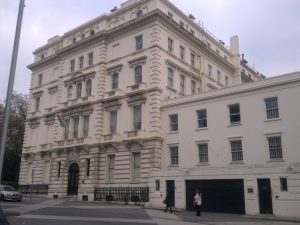On August 18, 2021, Keir Starmer stood in the House of Commons as the leader of the Labor Party and criticized the Conservative government’s response to the crisis unfolding in Kabul. In his remarks, aimed at Prime Minister Boris Johnson, who was on holiday at the time, he stated: “You cannot coordinate an international response from the beach,” highlighting the urgency of the situation in Afghanistan, as the capital, Kabul, had just fallen to the Taliban.
Now, under Starmer’s leadership, the Afghan embassy in London has been ordered to cease operations at a time when Afghanistan is fighting for its future. This raises an important question: How can diplomacy be coordinated when doors are closed?
The Afghan embassy in London is not a diplomatic or legal representative of the Taliban. Its staff and diplomats were appointed by the former Republic government of Afghanistan. It has no affiliation with the Taliban regime. This diplomatic mission, though representing a defunct government, serves as a voice for the people of Afghanistan and supports the Afghan diaspora in the U.K., operating independently of any ties to the Taliban.
I urge Prime Minister Keir Starmer to reconsider his government’s decision to close the Afghan embassy, as I believe it is a step in the wrong direction. It is morally wrong and must be reversed.
First, closing the Afghan embassy in London is not just a matter of administrative adjustments. It will have serious humanitarian consequences for thousands of Afghan nationals residing in the U.K. who rely on essential services provided by the embassy in London. Additionally, there will be diplomatic and legal implications for the Labor government. It signals a neglect of the Afghan people’s well-being and further alienates a population already suffering from the collapse of their country’s political system.
Second, Article 45 of the Vienna Convention on Diplomatic Relations (1961), to which the U.K. is a signatory, states: “If diplomatic relations are broken off between two States, or if a mission is permanently or temporarily recalled: (a) The receiving State must, even in the case of armed conflict, respect and protect the premises of the mission, together with its property and archives.”
The decision to close the Afghan embassy in London disrespects and disregards Article 45 of the Vienna Convention. Under this article, the functions and operations of the Afghan embassy remain relevant and active, as it represents the interests of the people of Afghanistan, if not its current regime. The embassy in London, and in other countries, can provide essential services to Afghan nationals residing in the U.K., regardless of the status of the central government in Afghanistan. Closing the embassy will cut off thousands of vulnerable people from these necessary services and undermine their legal rights, especially during an ongoing crisis.
Third, Afghanistan’s embassy in London is not an isolated example of an “embassy without a recognized government.” From 1996 to 2001, when the Taliban ruled Afghanistan, their regime was not recognized by any Western country. The Afghan embassy in London, which had no ties to the Taliban regime at the time, remained operational in that period. The only difference is that back then, it represented a government-in-exile.
Furthermore, the embassy of Sudan in London remains operational despite the absence of a central authority in Sudan or a globally recognized government, and ongoing internal turmoil and civil war. The embassy of Sudan provides consular services to the people of Sudan, who have the right to receive these services regardless of the political status quo at home. Similarly, Afghans residing in the U.K., the vast majority of whom oppose the Taliban, deserve to receive consular services, and have a representative that echoes their voices and concerns with the government of the U.K. Ordinary people should not be punished for the status of the political system in their home country.
Lastly, the closure of the Afghan embassy in London would place the U.K. government in a position where it may have to engage with the Taliban, a regime it does not recognize. The U.K. could soon find itself in a difficult situation, as four Western countries – Australia, Canada, Germany, and the Netherlands – are preparing to take the Taliban to the International Court of Justice (ICJ). A ruling from the ICJ could serve as a barrier for the U.K. in engaging with the Taliban. Therefore, it is preferable to keep the Afghan embassy open, allowing continued engagement with the Afghan people and receiving insights from the embassy, which represents the Afghan people and the former Republic government.
































